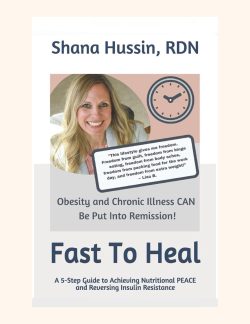What Is Intermittent Fasting?
Intermittent fasting is a lifestyle option that cycles between moderate to extended periods of time with no food, and periods of purposeful eating and feasting. It can also be thought of as time-restricted eating, when you are only eating during certain hours of the day. It is promoted to change body composition through loss of fat mass and weight. It is an excellent and sustainable method to improve markers of health that are associated with disease, such as blood sugar, blood pressure and cholesterol levels.
There are many different approaches to intermittent fasting that can provide lifestyle simplicity and flexibility. Depending on your goals and lifestyle, intermittent fasting can help you to achieve long-term weight loss and reverse chronic illness. I have used intermittent fasting to help hundreds of clients put their chronic illness into remission. This is achieved by using natural and innovative nutrition therapies that are quite the opposite of what we have been recommended.
IF can help reverse:
WEIGHT GAIN
PRE-DIABETES & TYPE 2 DIABETES
NON-ALCOHOLIC FATTY LIVER DISEASE
CRAVINGS AND FOOD NOISE
HIGH BLOOD PRESSURE
POLYCYSTIC OVARY SYNDROME (PCOS)
At first I disregarded IF and rolled my eyes when I heard it referenced. Surely skipping meals and going long periods of time without eating was unhealthy! However, I kept hearing the benefits broadcasted from professionals I had a lot of respect for, so I opened my mind and started doing my own research. I also implemented it myself, and noticed huge metabolic improvements. It was one of the hallmark strategies I used to reverse my own insulin resistance.
In a nutshell:
Fasting is basically defined as any time you are not eating. Contrary to what we have been taught, it is not necessary to eat the moment we wake up. Our body naturally stimulates us as we wake. However, following the same exact routine every single day can make things almost too predictable for our bodies. It’s good to change things up sometimes to force it to adapt!
I found that fasting through breakfast for many years eventually led to cortisol imbalance and I had to change my fasting times to protect my hormones. I now use a more circadian style of fasting, and if I am going to fast through a meal, it is typically dinner.
There are many different ways to fast, and many different strategies to try. You will find a strategy that works for you and fits in your lifestyle! The concepts are simple. Once you learn the science behind intermittent fasting and how to implement it step by step, you will realize how powerful this lifestyle is. I lay this all out in my book, Fast To Heal!


